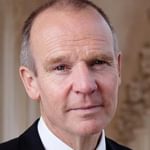Event Recording:
Covid-19 killed around two million people in 2020. At the same time, the social and economic impact of the pandemic led to an 8% reduction in greenhouse gas emissions, the biggest one-year decline on record.
As the pandemic is brought under control from 2021 onwards, by supplementing current control methods with vaccination, there are big opportunities to sustain the benefits of lower emissions for health and well-being. The direct benefits are fewer droughts, floods, heatwaves, storms and wildfires, and cleaner air. Indirect health benefits are expected from better nutrition, safe sanitation, energy-efficient health services, and jobs in the green economy, among others.
In this conversation, Sir Andy Haines (Professor of Environmental Change and Public Health, London School of Hygiene & Tropical Medicine) and Chris Dye (Professor of Epidemiology, University of Oxford) consider how better health and well-being are both an argument for, and a consequence of, making progress towards “net zero” carbon emissions.

Sir Andy Haines
Professor of Environmental Change and Public Health, LSHTM
Sir Andy is Professor of Environmental Change and Public Health with a joint appointment in the Department of Public Health, Environments and Society and in the Department of Population Health. He is also a member of the Council on The Rockefeller Foundation Economic Council on Planetary Health at the Oxford Martin School. He was previously Director (originally Dean) of LSHTM for nearly 10 years up to October 2010, having previously been Professor of Primary Health Care at UCL between 1987-2000. He worked part-time as a general practitioner in North London for many years.
Between 1993-6 he was on secondment as Director of Research & Development at the NHS Executive, North Thames and he was consultant epidemiologist at the MRC Epidemiology and Medical Care Unit between 1980-7. He has also worked internationally in Nepal, Jamaica, Canada and the USA.
He has been a member of a number of major international and national committees including the MRC Global Health Group (chair) and the MRC Strategy Group. He was formerly chair of the Universities UK Health and Social Care Policy Committee and a member of the WHO Advisory Committee on Health Research. In recent years his research focus has been on the effects of environmental change on health and the impact of policies to adapt to or mitigate these changes. He was a member of Working Group 2 of the UN Intergovernmental Panel on Climate Change for the second and third assessment reports and review editor of the health chapter in the fifth assessment report. He chaired the Scientific Advisory Panel for the 2013 WHO World Health Report on Research for Universal Health Coverage. In 2014/2015 he chaired the Rockefeller Foundation/Lancet Commission on Planetary Health and co-chaired the development group for the Health Knowledge Action Network of Future Earth. He was co-chair of the European Academies Science Advisory Committee working group on climate change and health in Europe which published its report in June 2019. He is currently co-chair the InterAcademy Partnership(~140 science academies worldwide) working group on climate change and health. He also co-chairs the Lancet Pathfinder Commission on health in the zero-carbon economy and participate in the Lancet Commissionon Pollution and the Lancet Commission on the COVID-19 response.

Professor Chris Dye
Professor of Epidemiology
Chris Dye began professional life as an ecologist in the UK, having been awarded degrees in biology (BA) from the University of York and zoology (DPhil) from the University of Oxford.
After developing an interest in infectious diseases at Imperial College London, he moved to the London School of Hygiene and Tropical Medicine to bring his research closer to public health. He was head of the School’s Vector Biology and Epidemiology Unit until 1996, carrying out research on leishmaniasis, malaria, rabies and other infectious and zoonotic diseases in Africa, Asia and South America.
In 1996, he joined the World Health Organization where he developed methods for using national surveillance and survey data to study the large-scale dynamics and control of tuberculosis (TB) and malaria, and Ebola and Zika viruses. As WHO’s Director of Strategy between 2014 and 2018, he worked with governments and other agencies to strengthen WHO's scientific work and to translate science into health policy.
From 2006 to 2009, he was also Professor of Physic at Gresham College, 35th in a lineage of professors that have been giving public lectures in the City of London since 1597.
During the Covid-19 pandemic, Chris led the work of a UK-wide group of scientists to set out the evidence and the facts on COVID-19 through “Coronavirus: The Science Explained”, a website hosted by UK Research and Innovation, the UK's funding agency for science and research. He is also a member of the Royal Society SET-C steering committee that provides rapid science advice on the pandemic to government (https://royalsociety.org/topics-policy/projects/set-c-science-in-emergencies-tasking-covid/).
Keep in touch
If you found this page useful, sign up to our monthly digest of the latest news and events
Subscribe